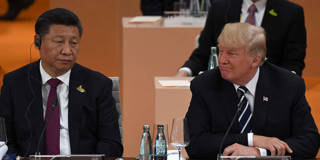Though Chinese leaders are watching the US presidential election closely, they have already convinced themselves that the next American administration will be antagonistic. Will they respond with relative quiescence or pursue a more aggressive strategy?
NEW YORK – How will the Communist Party of China (CPC) react to America’s highly unpredictable election in November? China is convinced that the desire to stunt its natural growth and contain its legitimate exercise of global influence is one of the few points of agreement between Democrats and Republicans. Their only disagreement, Chinese leaders believe, is about which economic and political weapons to use to contain China, and how and when to use them.

NEW YORK – How will the Communist Party of China (CPC) react to America’s highly unpredictable election in November? China is convinced that the desire to stunt its natural growth and contain its legitimate exercise of global influence is one of the few points of agreement between Democrats and Republicans. Their only disagreement, Chinese leaders believe, is about which economic and political weapons to use to contain China, and how and when to use them.